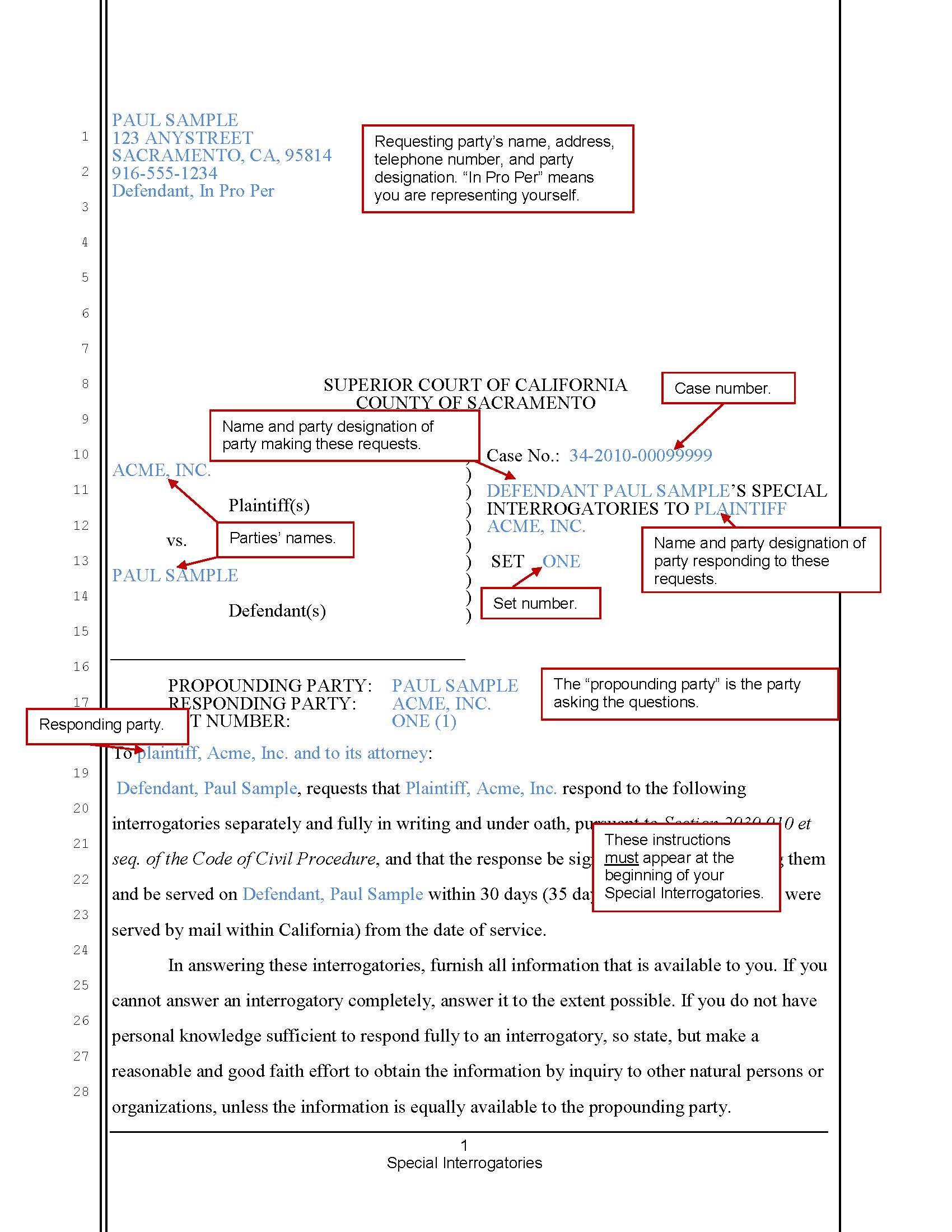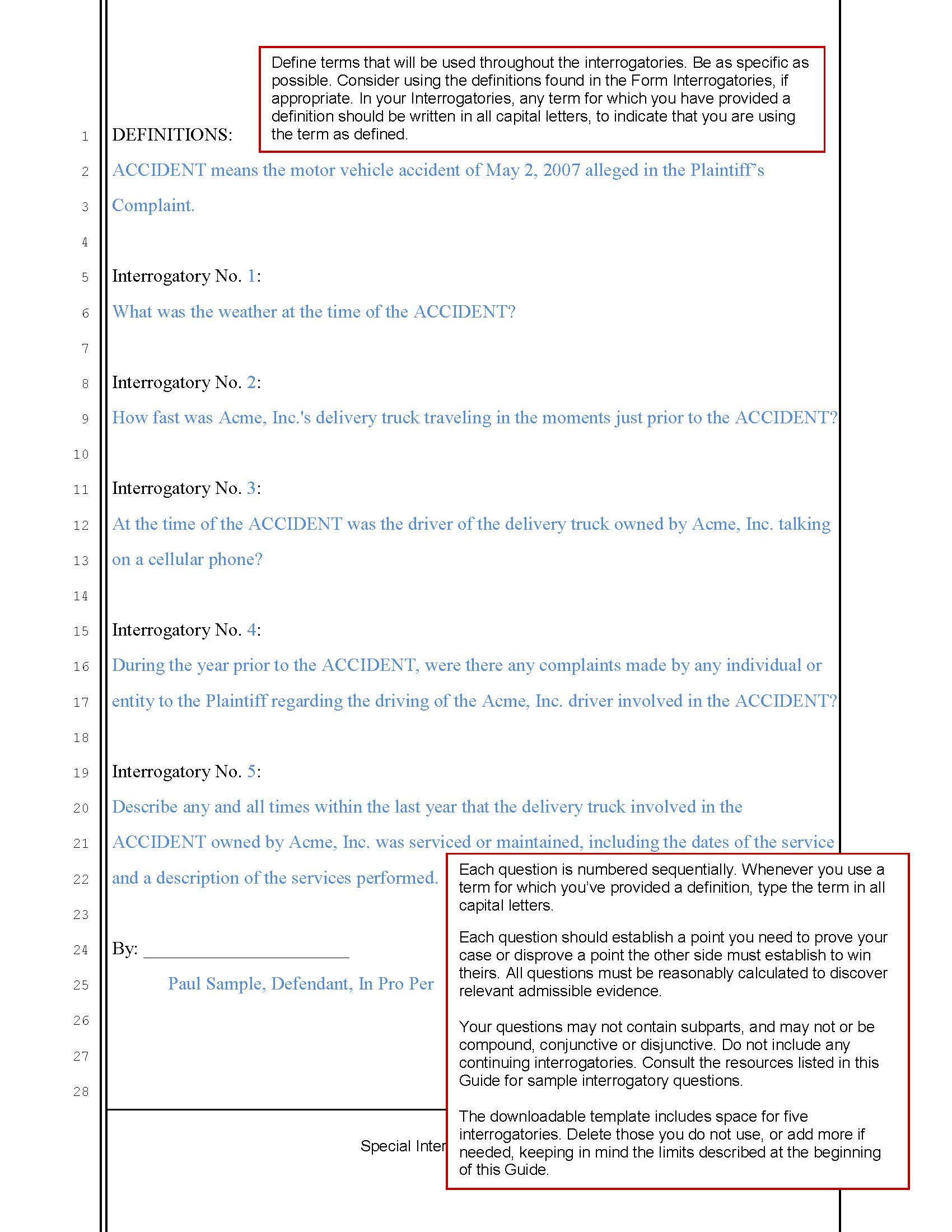Discovery: Special Interrogatories
Templates and Forms
Interrogatories are written questions sent by one party in a lawsuit to another party in that same suit, which the responding party must answer under penalty of perjury. Interrogatories allow the parties to ask who, what, when, where and why questions, making them a good method for obtaining new information.
Step-by-Step Guides on Responding to Discovery
- Responding to Interrogatories
- Responding to Requests for Admission
- Responding to Requests for Production
Step-by-Step Guides on Making Discovery Requests
Other Guides on Discovery
Related Videos
There are two types of interrogatories: form interrogatories and special interrogatories. This Guide will discuss special interrogatories; for information about form interrogatories, see the Step-by-Step guide on Form Interrogatories.
Special interrogatory questions are written by the parties. Writing customized questions allows the parties to obtain the specific information needed in their case. Each question should be written to establish a point the party needs to prove their case or to obtain information needed to disprove the other party’s case.
In a limited civil case (cases demanding less than $25,000, or $35,000 if filed after Jan. 1, 2024) you may ask each party only 35 discovery questions total, whether they are form interrogatories, special interrogatories, requests for admission, or requests for production of documents. Keep this limit in mind when writing your requests, to ensure that you are able to obtain all the information you’ll need for your case. If you ask the other party to answer 35 interrogatories, you will not be able to request any admissions or to request any documents. In an unlimited civil case (over the dollar limit), parties may ask 35 special interrogatories.
Step-by-Step Instructions
1
Write Your Interrogatories
There is no Judicial Council form specifically for this procedure. Instead, the relevant document must be typed on 28-line pleading paper. A customizable template may be downloaded from this link:
This template includes some legally required language, as well as space for five interrogatories. Delete those you do not use, or add more if needed, keeping in mind the limits described above.
California Code of Civil Procedure (CCP) § 2030.060 places several limits on these questions. Subparts are prohibited, as are compound, conjunctive, or disjunctive questions. This means you cannot write questions that have multiple parts (a, b, c, etc., like those found in the form interrogatories), or that ask for more than one piece of information connected with an “and,” which is a conjunctive, or an “or,” which is a disjunctive.
CCP § 2030.060 also prohibits the use of continuing interrogatories, which are questions asking the responding party to update their prior answers with any additional information they obtain after the interrogatory has been answered. For this reason, it is often advantageous to serve a final set of special interrogatories near the end of a case asking whether any of the information provided in the prior responses early in the case has changed in any way. For sample questions you may wish to include in your special interrogatories, see the resources listed at the end of this Guide.
It is often difficult to know what questions you should ask, and how to ask them. Although it is not possible to tell you what you what you should ask, as this is very specific to your case, a few suggestions may help you in writing your interrogatories:
Make sure that the question you are asking seeks information that would tend to prove or disprove something that must be proven in your case;
Write your request as clearly as possible. The easier your interrogatory is to understand, and the less ambiguous it is, the less likely it is for the other side to validly object that your request is vague, ambiguous, or overly broad, etc.
Use dates, account numbers, and other information to ask reasonably narrow questions. Asking “State all facts that prove the ASKING PARTY is at fault,” for example, would be vague, ambiguous, and overly broad, but “State all facts which support the contention in your Answer that the ASKING PARTY was responsible for the accident alleged in the Complaint,” would be more likely to yield a response rather than an objection.
Remember that special interrogatories are questions requesting written answers, and cannot be used to compel the responding party to produce documents.
Use the interrogatories of others and samples in the resources listed below as a model to assist with drafting your interrogatories.
2
Make Photocopies
Make one photocopy of your special interrogatories for each party (other than you) in the case.
3
Have Your Requests Served
A photocopy of your special interrogatories must be served on the attorney for the responding party or directly to the responding party if he or she is self-represented (in pro per). Courtesy copies should be served on all other attorneys or self-represented parties in the case. Service may be completed by mail, by a person over the age of 18 who is not a party to the case. The person serving your requests must complete a proof of service form, typically a Proof of Service by First Class Mail (POS-030). For more information, see the Step-by-Step guide on Proof of Service by Mail.
4
Retain Your Originals for Your Records
The original special interrogatories and signed proof of service should be retained for your records. If the other party does not respond to your requests, you may use these documents to support a motion to have the court compel responses. For more information, see our guide on Motions to Compel.
For More Information
On the Web
Introduction to Discovery – Part 6: Propounding Special Interrogatories
Part 6 of this video series from the Sacramento County Public Law Library’s Civil Self Help Center will help you understand what special interrogatories are, and how to propound these types of requests.
At the Law Library
Bender’s Forms of Discovery KF 8900 .A3 B45
California Civil Discovery KFC 1020 .H64
Electronic Access: On the Law Library’s computers, using Lexis Advance.
California Civil Discovery Practice KFC 1020 .C35
Electronic Access: On the Law Library’s computers, using OnLaw.
California Civil Litigation and Discovery KFC 995 .G674
California Discovery Citations KFC 1020 .F56
California Forms of Pleading and Practice KFC 1010 .A65 C3 (Ready Reference)
Electronic Access: On the Law Library’s computers, using Lexis Advance.
California Practice Guide: Civil Procedure Before Trial KFC 995 .W45
Model Interrogatories KF 8900 .C84
Samples


This material is intended as general information only. Your case may have factors requiring different procedures or forms. The information and instructions are provided for use in the Sacramento County Superior Court. Please keep in mind that each court may have different requirements. If you need further assistance consult a lawyer.






